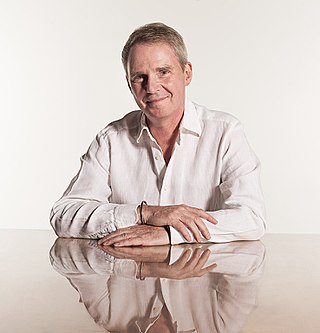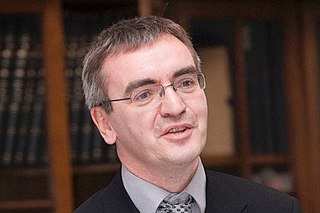
The Department of Computer Science at the University of Manchester is the longest established department of Computer Science in the United Kingdom and one of the largest. It is located in the Kilburn Building on the Oxford Road and currently has over 800 students taking a wide range of undergraduate and postgraduate courses and 60 full-time academic staff.

The Department of Computer Science and Technology, formerly the Computer Laboratory, is the computer science department of the University of Cambridge. As of 2023 it employed 56 faculty members, 45 support staff, 105 research staff, and about 205 research students. The current Head of Department is Professor Ann Copestake.

Hermann Maria Hauser, KBE, FRS, FREng, FInstP, CPhys is an Austrian entrepreneur, venture capitalist and inventor who is primarily associated with the Cambridge technology community in England.

Eugene Howard Spafford, known as Spaf, is an American professor of computer science at Purdue University and a computer security expert.

Sir Andrew Hopper is a British-Polish computer technologist and entrepreneur. He is treasurer and vice-president of the Royal Society, Professor of Computer Technology, former Head of the University of Cambridge Department of Computer Science and Technology, an Honorary Fellow of Trinity Hall, Cambridge and Corpus Christi College, Cambridge.

The Oxford Internet Institute (OII) is a multidisciplinary department of social and computer science dedicated to the study of information, communication, and technology, and is a part of the Social Sciences Division of the University of Oxford, England.

Charles Eric Leiserson is a computer scientist, specializing in the theory of parallel computing and distributed computing, and particularly practical applications thereof. As part of this effort, he developed the Cilk multithreaded language. He invented the fat-tree interconnection network, a hardware-universal interconnection network used in many supercomputers, including the Connection Machine CM5, for which he was network architect. He helped pioneer the development of VLSI theory, including the retiming method of digital optimization with James B. Saxe and systolic arrays with H. T. Kung. He conceived of the notion of cache-oblivious algorithms, which are algorithms that have no tuning parameters for cache size or cache-line length, but nevertheless use cache near-optimally. He developed the Cilk language for multithreaded programming, which uses a provably good work-stealing algorithm for scheduling. Leiserson coauthored the standard algorithms textbook Introduction to Algorithms together with Thomas H. Cormen, Ronald L. Rivest, and Clifford Stein.

The Department of Computer Science is the computer science department of the University of Oxford, England, which is part of the university's Mathematical, Physical and Life Sciences Division. It was founded in 1957 as the Computing Laboratory. By 2014 the staff count was 52 members of academic staff and over 80 research staff. The 2019, 2020 and 2021 Times World University Subject Rankings places Oxford University 1st in the world for Computer Science. Oxford University is also the top university for computer science in the UK and Europe according to Business Insider. The 2020 QS University Subject Rankings places The University of Oxford 5th in the world for Computer Science.
The Engineering and Physical Sciences Research Council (EPSRC) is a British Research Council that provides government funding for grants to undertake research and postgraduate degrees in engineering and the physical sciences, mainly to universities in the United Kingdom. EPSRC research areas include mathematics, physics, chemistry, artificial intelligence and computer science, but exclude particle physics, nuclear physics, space science and astronomy. Since 2018 it has been part of UK Research and Innovation, which is funded through the Department for Business, Energy and Industrial Strategy.

Paul Dourish is a computer scientist best known for his work and research at the intersection of computer science and social science. Born in Scotland, he holds the Steckler Endowed Chair of Information and Computer Science at the University of California, Irvine, where he joined the faculty in 2000, and where he directs the Steckler Center for Responsible, Ethical, and Accessible Technology. He is a Fellow of the AAAS, the ACM, and the British Computer Society, and is a two-time winner of the ACM CSCW "Lasting Impact" award, in 2016 and 2021.
Professor Stanley J. Gill was a British computer scientist credited, along with Maurice Wilkes and David Wheeler, with the invention of the first computer subroutine.
Ursula Hilda Mary Martin is a British computer scientist, with research interests in theoretical computer science and formal methods. She is also known for her activities aimed at encouraging women in the fields of computing and mathematics. Since 2019, she has served as a professor at the School of Informatics, University of Edinburgh.

Sir Nigel Richard Shadbolt is Principal of Jesus College, Oxford, and Professorial Research Fellow in the Department of Computer Science, University of Oxford. He is chairman of the Open Data Institute which he co-founded with Tim Berners-Lee. He is also a visiting professor in the School of Electronics and Computer Science at the University of Southampton. Shadbolt is an interdisciplinary researcher, policy expert and commentator. His research focuses on understanding how intelligent behaviour is embodied and emerges in humans, machines and, most recently, on the Web, and has made contributions to the fields of Psychology, Cognitive science, Computational neuroscience, Artificial Intelligence (AI), Computer science and the emerging field of Web science.
The UK Energy Research Centre (UKERC) carries out interdisciplinary research into sustainable future energy systems. It's whole systems research programme addresses the challenges and opportunities presented by the transition to a net zero energy system and economy.

Genevieve Bell is an Australian cultural anthropologist, best known for her work at the intersection of cultural practice research and technological development, and for being an industry pioneer of the user experience field. Bell was the inaugural director of the Autonomy, Agency and Assurance Innovation Institute (3Ai), which was co-founded by the Australian National University (ANU) and CSIRO’s Data61, and a Distinguished Professor of the ANU College of Engineering and Computer Science. In 2021, she became Director of the new ANU School of Cybernetics. She also holds the university's Florence Violet McKenzie Chair, and is the first SRI International Engelbart Distinguished Fellow. Bell is also a Senior Fellow and Vice President at Intel. She is widely published, and holds 13 patents.
The Intel Research Labs were a research division of Intel. The organization was known for most of its life as Intel Research, but towards the end of its life the name Intel Research was re-defined to refer to all research performed in Intel, including work done outside the labs.

Sethuraman Panchanathan is an Indian-American computer scientist and academic administrator, and the 15th Director of National Science Foundation since June 2020.

Tom Rodden is Chief Scientific Adviser for the UK Government’s Department for Culture, Media and Sport. He was previously Deputy Chief Executive of the Engineering and Physical Sciences Research Council (EPSRC). Tom is Professor of Computing at the University of Nottingham and co-director of the Mixed Reality Laboratory, an interdisciplinary research facility. In 2008, as a member of the UK Research Assessment Exercise 2008 computing panel, he was responsible for assessing the international quality of computer science research across all UK departments. In 2014 he served in the Research Excellence Framework assessment panel for computing and he is the deputy chair of the Hong Kong RAE 2014 computing panel.
Marina Denise Anne Jirotka is professor of human-centered computing at the University of Oxford, director of the Responsible Technology Institute, governing body fellow at St Cross College, board member of the Society for Computers and Law and a research associate at the Oxford Internet Institute. She leads a team that works on responsible innovation, in a range of ICT fields including robotics, AI, machine learning, quantum computing, social media and the digital economy. She is known for her work on the 'Ethical Black Box', a proposal that robots using AI should be fitted with a type of inflight recorder, similar to those used by aircraft, to track the decisions and actions of the AI when operating in an uncontrolled environment and to aid in post-accident investigations.

Ann Blandford FHEA is Professor of Human-Computer Interaction (HCI) at University College London (UCL). She serves as deputy director of the UCL Institute of Healthcare Engineering. Her research focuses on behaviour change, well-being, and human errors in the field of healthcare.














